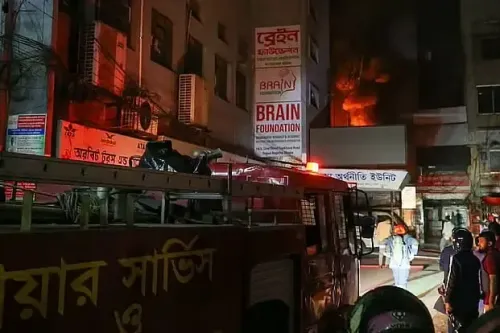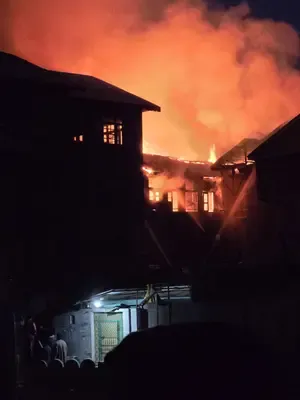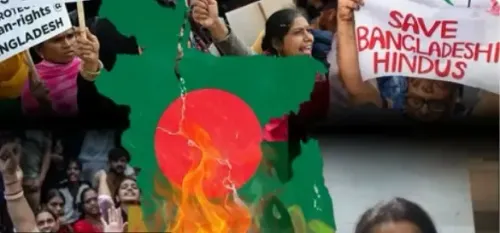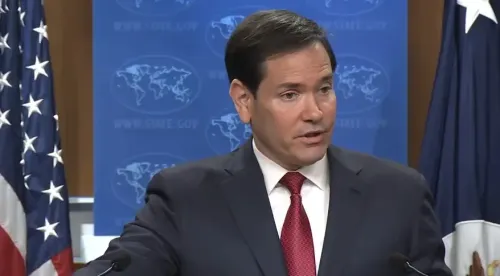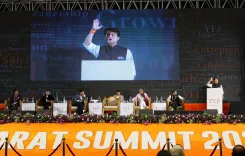Is Bangladesh South Asia's Next 'Bloody Battlefield'?
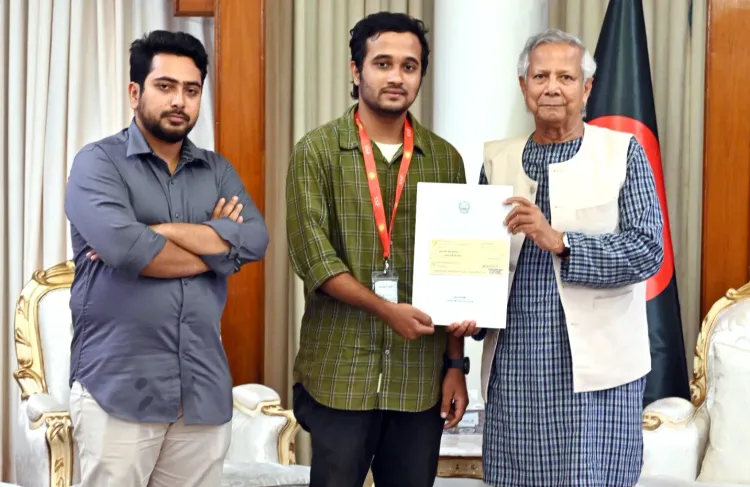
Synopsis
Key Takeaways
- Bangladesh faces rising extremism as radical groups gain influence following political upheaval.
- International involvement, particularly from Turkey, poses both opportunities and risks for security.
- The formation of the Islamic Revolutionary Army threatens regional stability.
- Violence against minorities has surged, raising humanitarian concerns.
- The situation in Bangladesh has implications that extend beyond its borders, affecting South Asia's security.
New Delhi: Following the ousting of former Prime Minister Sheikh Hasina on August 5, 2024, extremist Islamist factions such as Hizb ut-Tahrir (HuT) have been actively engaging in terrorist operations in Bangladesh under the leadership of the interim government helmed by Muhammad Yunus. A reign of terror has been established throughout the nation by mobs operating under the banner of 'Tawhidi Janata'. The atmosphere of fear surrounding terrorism is escalating further as Jama'at-e-Islami (JeI) and militant students are making arrangements to create an armed militia known as the 'Islamic Revolutionary Army'. This development poses a significant threat not only to the stability of Bangladesh but also to the security of neighboring India and the broader South Asian region.
With support from Turkey and the Pakistani intelligence agency ISI, the geopolitical situation in the area has become perilous. The formation of the 'Islamic Revolutionary Army' commenced on December 20, 2024, under the 'Anti-Discrimination Student Movement', which is backed by various former US officials and George Soros. Utilizing the cancellation of previous security clearances for Pakistani individuals to enter Bangladesh, militants from ISI, Lashkar-e-Taiba, and other factions have also begun infiltrating the country.
In tandem, Bangladesh has procured Bayraktar TB2 Drones, Otokar Kobra IMVs, mine-resistant MRAPs, light armored combat vehicles, RN-94 armored ambulances, TRG-300 Tiger MLRS, and TRG-230 Surface-to-Surface Missiles, among other defense systems from Turkey. Reports from international intelligence sources indicate that numerous military agreements have been established during these transactions. The acquisition of such military hardware hints at the extensive ambitions of these new Islamist factions in Bangladesh and their long-term plans for security in South Asia. Currently, Bangladesh is negotiating with Turkey to establish defense industrial complexes in Chattogram and Narayanganj.
Haluk Gorgun, the Secretary of Turkish Defence Industries, is set to visit Dhaka on July 8. During his visit, he is expected to meet with Bangladesh Army Chief General Waqar-uz-Zaman, Navy Chief Admiral Mohammad Nazmul Hasan, and Air Chief Marshal Hasan Mahmood Khan, in addition to a courtesy call on Yunus.
This visit comes in the wake of the Iran-Israel conflict and carries substantial diplomatic implications. It seeks to enhance bilateral defense cooperation, with anticipated discussions revolving around training, technology transfer, arms procurement, and joint investments. Since 2018, defense relations between Bangladesh and Turkey have progressed significantly. Ankara is aiming to solidify its strategic presence in Bangladesh.
Earlier this year, Turkey’s Trade Minister Omer Bolat led a substantial delegation to Dhaka on January 9, where he engaged in discussions with Bangladeshi officials regarding technology transfer, energy matters, infrastructure, defense sector investments, logistics, mining, e-commerce, and clean energy. Gorgun's impending visit is viewed as a pivotal move towards fostering strategic partnerships and boosting Bangladesh’s defense capabilities through foreign investments.
Under Yunus' leadership, radical Islamist groups that were previously banned during the Awami League era are now operating freely, including Hizb ut-Tahrir (HuT), Hefazat-e-Islam (HeI), Jama'at-e-Islami (JeI), and the Ansarullah Bangla Team (ABT), also recognized as Ansar-al Islam Bangladesh. Since August 2024, the Yunus administration has released convicted Islamist terrorists, unleashing jihadis on the streets to perpetrate widespread violence against minorities, particularly Hindus. In 2024, over 2,200 incidents of violence against Hindus were documented in Bangladesh. The ultimate aim of these extremist Islamist organizations is to establish a global Islamic caliphate. Analysts caution that if this Islamic takeover succeeds in Bangladesh, the country could devolve into another terrorist state akin to Afghanistan under the Taliban or Syria under its new leader Ahmed Hussein al-Sharaa.
HuT is a global Islamist movement aspiring to unify Muslims under an Islamic caliphate, with members involved in violent activities in numerous countries. The group is banned in at least 13 nations, including many Muslim-majority states. Although banned in Bangladesh, HuT is rapidly expanding and organizing under the current conditions. Under Yunus's un-elected, illegitimate regime, Islamist hardliners and convicted terrorists have been released from detention. On August 31, Mamunul Haque, a leader of HeI, which is also working to establish an Islamic Sharia state in Bangladesh, was freed from incarceration.
Exploiting the existing extreme polarization in the country, jihadist groups have come to dominate the political landscape of Bangladesh. On March 7, thousands of members of the banned Islamist militant group HuT defied police barricades and marched through the streets of Dhaka, demanding the establishment of an Islamic caliphate. The crowd at the rally became violent, throwing stones and clashing with law enforcement. The 'March for Khilafat' rally in Dhaka received support from some advisors within the interim government, including Asif Nazrul, Nahid Islam, Asif Mahmud Sajib Bhuiyan, and Mahfuz Alam. Nasimul Gani, a founding member of HuT, has been appointed as the Home Secretary.
The Yunus administration also released Jashimuddin Rahmani, the leader of the Al-Qaeda-affiliated terrorist organization Ansarullah Bangla Team (ABT). Rahmani, who was imprisoned for the murder of blogger Rajib Haider, was granted parole. ABT is attempting to construct a jihadi network in Bangladesh with the support of sleeper cells. After the Sheikh Hasina government banned ABT in May 2015, the group rebranded itself as 'Ansar al-Islam' and was subsequently banned again in 2017.
Notably, on March 31, Michael Rubin, a Senior Fellow at the American Enterprise Institute (AEI) and former Pentagon official, stated in a report for the 'Washington Examiner': 'Declare Bangladesh's Jamaat-e-Islami (JeI) a Foreign Terrorist Organization'.
JeI is a radical Islamist party deeply entrenched in terrorism. Its founder, Sayyid Abul Al'a Maududi, aimed to create a more conservative Islamist nation by rejecting both Western and liberal democracies, similar to the Muslim Brotherhood. Within Bangladesh, the pro-Pakistani JeI has been particularly brutal, closely involved in the 1971 Bangladesh Genocide that resulted in the deaths of over three million individuals. For this reason, JeI members are considered war criminals in Bangladesh.
After Adolf Hitler's Nazi party, JeI was the second political party to face an international tribunal for its crimes. Despite this, JeI continues to receive active support from Pakistan's Inter-Services Intelligence (ISI) Agency.
Since Sheikh Hasina's removal, Yunus has imprisoned over 1,000 journalists and filed murder charges against several in an effort to rule without accountability. Yunus and Bangladesh JeI, with backing from the Bangladesh Nationalist Party (BNP), have conspired to suppress Awami League activities.
Michael Rubin further asserts in his report: 'American policymakers and diplomats issue anti-terrorism statements, but they do not strongly emphasize that JeI is ideologically involved in terrorism.' He continues, 'JeI is a terrorist organization. The State Department should designate Jamaat as a Foreign Terrorist Organization. Under Executive Order 13224, signed by President George W. Bush, the Treasury Secretary should also identify and seize the group's assets and properties. Instead of treating a group responsible for genocide in Bangladesh and for bolstering Al-Qaeda as an ordinary political party, President Donald Trump and Secretary of State Marco Rubio should not be as negligent as Joe Biden and Secretary of State Antony Blinken but rather judge JeI as a dangerous and ideologically motivated terrorist group similar to Hamas or Al-Qaeda.
Meanwhile, Turkey is also rapidly increasing its influence within the Islamic world. Under President Erdogan, the nation is significantly intervening in South Asia, particularly through defense agreements with Pakistan and Bangladesh.
Turkish forces are now stationed in at least 11 foreign nations—including Syria, Iraq, Qatar, Northern Cyprus, Bosnia, Albania, Kosovo, Libya, Sudan, Somalia, and Azerbaijan. Having secured important security and military agreements with four nations—Iraq, Somalia, Bulgaria, and Romania—Ankara has initiated new defense agreements with Pakistan and Bangladesh as of January 2025.
The expansionist, pan-Islamist Turkish regime has begun meddling in the internal affairs of South Asian countries, aiming to exploit internal divisions to establish a solid foothold for its neo-imperialist agenda. Bangladesh is increasingly hosting Turkish officials who shamelessly seek military, economic, and food assistance from Turkey.
Bangladesh has already emerged as Turkey's fourth-largest market for military products and has acquired Bayraktar TB2 UCAVs, many of which have been sold to conflict-ridden nations such as Ukraine, Syria, Ethiopia, Burkina Faso, Mali, and Azerbaijan.
Additionally, many Rohingya youth residing in refugee camps are preparing for 'jihad' and 'war'. A young man in the Ukhia camp stated, 'They are urging us to achieve independence in our own country through warfare. Everyone is ready for jihad. We are all collaborating with the Arakan Rohingya Salvation Army (ARSA) and Rohingya Solidarity Organisation (RSO).'
All these indicators suggest escalating trouble, not only for Bangladesh but for the entire region.
(The author is an expert on South Asia and Eurasia. He previously worked with the Manohar Parrikar Institute for Defence Studies and Analyses. The views expressed are personal)


